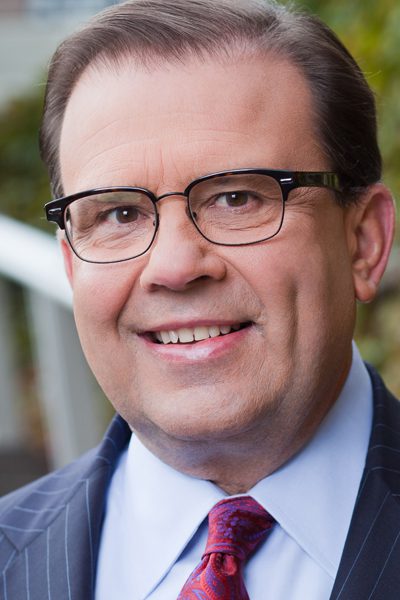

The opioid crisis, in pure numbers, has struck Michigan and the rest of the nation in profound ways. According to recent data, there were nearly 1,800 opioid-related overdose deaths in 2016 in Michigan, with deaths tripling in the past five years.
In fact, the situation has become so dire that even the Mackinac Policy Conference is addressing the issue this week as part of the 2018 event on Mackinac Island. The panel, which includes health care officials, law enforcement and business leaders, will talk about the impact opioids are having on Michigan workplaces and, in turn, homes, hospitals and beyond.
Daniel J. Loepp, president and chief executive officer of Blue Cross Blue Shield of Michigan, has seen what opioids and addiction to this destructive substance can do. As an employer, as a nonprofit mutual insurance company and as a community leader, Loepp and the BCBSM staff are acutely aware of how much this epidemic is affecting the state and beyond.
Loepp is speaking on the Opioids in the Workplace panel Wednesday at the Mackinac Policy Conference. The panel will tackle the use and abuse of prescription opioids and other synthetic drugs in the state. It also will dissect the rampant availability of these drugs and the impact on employee productivity, talent availability, absenteeism and overall health care cost. The panel’s goal is to help businesses determine steps to take to mitigate the effects on employees and their companies through policies and programs.
Some background on Loepp: He played a major role in modernizing the state’s health care delivery system in a process that led to the January 2014 enactment of new laws that transformed BCBSM to become a nonprofit mutual insurance company. Loepp has led BCBSM initiatives to improve health care quality while slowing cost increases, saving nearly $1.5 billion through several programs that have garnered national attention and served as models implemented across the country.
Under his leadership, the Blues are helping to revitalize and strengthen Detroit, Grand Rapids and Lansing. In 2011 and 2012, the Blues moved 3,000 BCBSM employees into downtown Detroit, making the company one of the largest employers in the city’s Central Business District. And in Lansing, BCBSM subsidiary AF Group transformed a long-abandoned power plant into a national headquarters.
Loepp joined the Blues in 2000. In 2011, 2012 and 2013, he served as board chair of the Blue Cross and Blue Shield Association (BCBSA), an organization that includes all 36 Blues plans and provides health coverage to more than 106 million Americans. He continues to serve on the BCBSA board and is also on the board of the National Institute for Health Care Management. The list continues with Loepp’s role as executive committee chairman of the Downtown Detroit Partnership and as chairman of the board of directors at the Michigan Thanksgiving Parade Foundation. Finally, in 2015 Governor Rick Snyder appointed Loepp to serve on the Mackinac Island State Park Commission.
Blue Cross Blue Shield of Michigan is a nonprofit mutual insurance company founded in 1939. It is the largest health insurer in Michigan, serving 4.5 million people and 1.6 million more in other states, with the largest network of doctors and hospitals in Michigan: 152 hospitals, and more than 33,000 doctors. It also has more than 8,100 employees.
Here are Loepp’s thoughts on Mackinac, the panel and the opioid crisis:
Q: What have you learned about opioid usage in Michigan that made you want to participate in a panel like this?
A: As Michigan’s largest health insurer with a strong social mission, Blue Cross Blue Shield of Michigan has a responsibility to address the growing opioid epidemic, which has become a national emergency. Personally, I am deeply moved by the troubling statistics of how this crisis is impacting the health of our residents. Everyone knows someone who has been impacted. The crisis is also having a big impact on workplaces. The national employer costs were $20.4 billion in employee productivity in 2013. And health costs in Michigan were $830 million. Blue Cross has significant efforts underway to combat the epidemic by enhancing awareness and through partnerships with physicians and public health advocates and officials, and I wanted to share strategies and encourage partnerships.
Q: What is the most important message(s) you hope to convey?
A: Blue Cross has a nearly 80-year history of caring about the health of our members and communities. Our response goes broad and deep to address the crisis. For instance, we’re engaging all stakeholders and partnering across communities in a comprehensive approach to solve the crisis through a four-point plan. We’re also working to help people with opioid use disorder, help prevent addiction, get relief to people with legitimate pain management needs and support families in crisis.
Q: What should employers think about when it comes to opioids and their impact on the workplace?
A: This crisis is deeply affecting workplaces, our employees and their families. But we know—from results—that employers can make changes that save employees’ lives and improve their working environment. Blue Cross is seeing those results, and our work on this issue is already making a difference. Results include a 24 percent reduction in opioid prescriptions; 56 percent reduction in long-acting oxycodone and oxymorphone use; and 42 percent reduction in fentanyl use. We know much more needs to be done. Our multi-disciplinary task force and statewide partnerships are the infrastructures we need to develop good solutions.
Background on Blue Cross’ four-point plan to combat the opioid crisis
Prevention
• Target highly abused opioids with prior authorization, refill restrictions and quantity limits to minimize stockpiling and prevent the misuse and abuse of prescription opioids
• Policy change: Limit coverage of opioid prescriptions to 30-day supplies per fill; Members new to opioid therapy and receiving short-acting opioids limited to five-day supply
• Working with customers to understand the opioid epidemic and provide resources to help their business and employees – Opioid toolkit, Customer Advisory Council, Master Class Webinar series, www.mibluesperspectives.com/opioids101
Fraud Detection
• Encouraging e-prescribing—we’re incenting physicians through Value Partnership programs to protect against fraud and abuse
• Identify at-risk members – our pharmacists monitor claims for dangerous and highly addictive drug combinations; notify prescribers and if needed use our Controlled Substance Workgroup to recommend intervention
• Preventing Doctor shopping – Notify doctors to use the state’s Prescription Drug Monitoring Program when we see members obtain opioids from multiple prescribers and pharmacies —resulted in 250,000 fewer tablets dispensed in 2016
• Monitor outliers – review claims and use algorithms to identify outlier prescribers, pharmacies and members with opioid claims or dosages more than average amounts. We may remove prescribers and pharmacies from our networks or recommend physician intervention with impacted members
Treatment for Addiction
• Remove barriers – provide access to medication-assisted treatment without prior-authorization
• Meet members in the ER if they’ve overdosed – help from pharmacy, behavioral health experts – pilot and looking to expand
• CLIMB Protocol Pilot (Community-based, Life-changing, Individualized, Medically-assisted, evidence-based treatment)– Blue Care Network is piloting a substance abuse disorder protocol with two hospital partners to improve treatment through allowing time for the natural healing process with the use of medications, therapy and intensive social support. Maplegrove Center (part of Henry Ford Behavioral Health Services) and Pine Rest Christian Mental Health Services agreed to a specific treatment protocol for all patients with opioid use disorders during the cohort year.
Advocacy and Awareness
• Partner with Providers – Blue Cross and the MI Opioid Prescribing Engagement Network work with physician groups to improve prescribing practices
• Forge partnerships – working with America’s Health Insurance Plans’ and the Blue Cross plans across the nation to find best practices; Partnership with BCBSA and /Walgreens to co-brand 20 Safe Medication Disposal kiosks
• Engage community – Nearly $600,000 with the Blue Cross Blue Shield of MI Foundation, MI Health Endowment Fund, The Community Foundation for Southeast Michigan and the Superior Health Foundation to build evidence-based practices (education, law enforcement and clinical interventions) to fight opioid abuse.
• FAN – Families Against Narcotics – Linda Davis, district court judge of Macomb County started after seeing the problem in court and learning of her daughter’s struggle with drug addiction; now 20 chapters across MI; Hope not Handcuffs – tackles stigma of drug addiction with treatment rather than a criminal charge
• Provide Information to the public – mibluesperspectives.com/opioids101/




